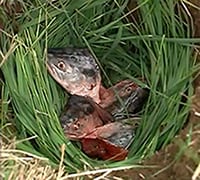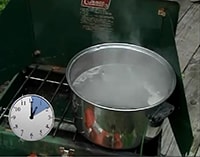What to know
- People in Alaska have usually gotten botulism from eating traditional Alaska Native food.
- Using traditional methods when preparing Alaska Native foods can prevent botulism.
- If in doubt, throw it out! Never taste food to see if it's safe.
What causes botulism?
Botulism is a disease caused by toxin made by Clostridium botulinum and related bacteria (germs). These bacteria are found naturally in many places, but it's rare for them to make people sick.
But, under certain conditions, the bacteria's spores (protective coatings) can grow and make botulinum toxin.
These conditions can happen when Alaska Native foods have not been prepared safely.
Some traditional foods linked to botulism
People in Alaska have gotten botulism usually from eating traditional Alaska Native foods, such as:
- Fermented fish heads ("stinky heads")
- Fermented fish eggs ("stinky eggs")
- Fermented beaver tail
- Fermented seal flipper
- Fermented walrus flipper
- Fermented whale
- Seal oil
- Dried, unsalted fish
5 tips for food safety
Eating home-fermented foods comes with some risk for botulism. Following these 5 food safety tips when preparing and serving Alaska Native foods to help protect yourself and your family.
1. Wash your hands, your containers, and your food.
- Wash your hands thoroughly with soap and water.
- Clean the containers and areas where your food will be placed.
- Wash your food before preparing it. This step will help reduce germs on the food, but does not remove all of them.
2. Use traditional methods for preparing Native foods.


- Ferment food using the traditional method of a grass-lined hole in the ground.
- Use methods that allow fresh air to circulate.
- Do not use plastic or glass containers. They prevent air from circulating.
- When air doesn't circulate around fermenting foods, bacteria in the food can grow and make the toxin that causes botulism.
- This can happen even if you do not put the lid on the container.
- Do not use plastic or glass containers. They prevent air from circulating.
- Use salt when drying fish. Salt is a natural preservative. Using it reduces the chances of getting botulism or another illness from the food.
3. Ferment food at a cold temperature.
- Keep food cold by fermenting it in the ground and away from the sun.
- Ideally, the temperature of the food should be colder than 37°F at all times.
- It might take longer to ferment the food kept cold, but it is safer.
4. Boil fermented food before eating it.

High temperatures can destroy the toxin that causes botulism. Boiling might change the taste from what you are used to, but it can protect you and your family from botulism.
- Boil the following foods in a saucepan before eating them:
- Home-fermented foods and other foods that contain it
- Fermented foods stored in plastic or glass containers
- Home-fermented foods and other foods that contain it
- At altitudes below 1,000 feet, boil foods for 10 minutes. Add 1 minute for each additional 1,000 feet of elevation.
5. When it doubt, throw it out!
You cannot see, smell, or taste the toxin that causes botulism. But taking even a small taste of food containing the toxin can be deadly.
- Do not eat food if you do not know whether it was prepared safely. Throw it out!
- It is much better to throw out food that might be contaminated than to eat it and get sick or lose the life of a loved one.
By following these simple tips, you give a helping hand to keep your family safe from botulism.
A Helping Hand
In this video, you will:
- Meet Alaska Native people who share their experiences with botulism
- Hear from doctors, nurses, and health aides who've treated people with the disease
- Learn what causes the disease, who can get it, what symptoms are like, and what type of treatment is used
But, most importantly, you'll learn how to keep yourself and your family safe from botulism.
ADD VIDEO PLAYER HERE
Botulism can be treated
Botulism is a medical emergency
Botulism is treated with antitoxin, which prevents the toxin from causing any more harm. Antitoxin does not heal the damage the toxin has already done. But it can prevent further harm.
Antitoxin works best when given early in the illness. That is why it's important to get medical help at the first signs of illness.
More information
Information related to food preservation is available through the University of Alaska's Cooperative Extension Service:
Information on botulism in Alaska is available through CDC and the Alaska Department of Health and Social Services. Contact us:
-
Centers for Disease Control and Prevention
4055 Tudor Centre Drive
Anchorage, Alaska 99508-5932 - Phone: 907-729-3400
- Email: ncidaip@cdc.gov
- Division of Public Health
3601 C Street, Suite 540
Anchorage, Alaska 99503 - Phone: 907-269-8000
- Email: infdisease@alaska.gov
